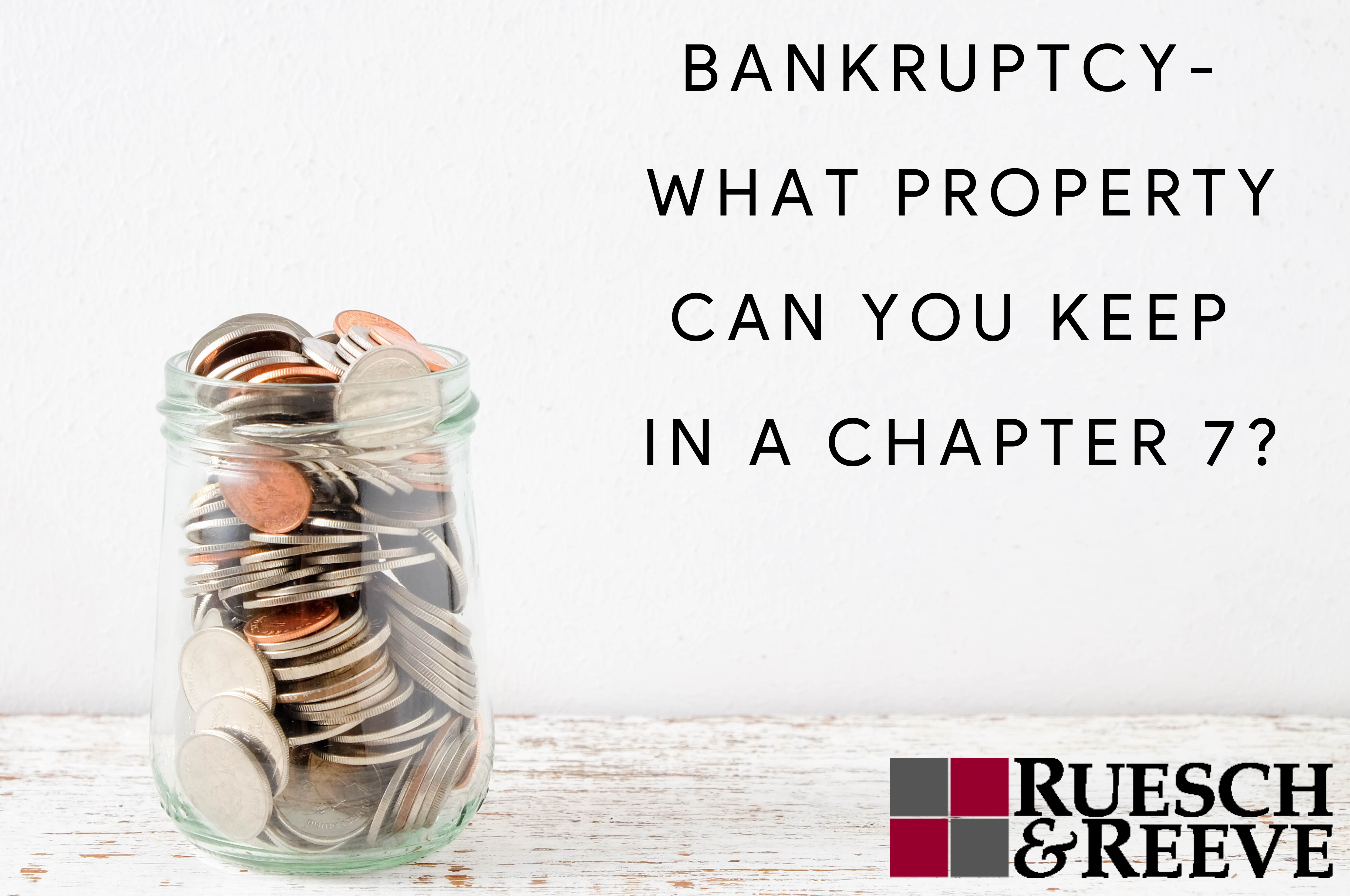What Property Can You Keep In Chapter 7?
Chapter 7 bankruptcy could also be known as liquidation, or straight bankruptcy. It requires the court to appoint a trustee. Who then takes your assets, sells them, and distributes the money to creditors who have filed the proper claims. They cannot receive payment without correct claims filed. Being the most common type of bankruptcy filed in the U.S., chapter 7 is still complex.
Creditors more often than not, don’t receive all that you owe them. Majority of Chapter 7 bankruptcy estates filed don’t have enough value to pay everyone their debts after collecting all exempt property. The leftover balances are then discharged and the debtor no longer owes that money. In Chapter 7 bankruptcies any wages you earn after the filing are yours to keep.
Before filing for chapter 7, make sure you account for all of your assets, exempt and non-exempt. Calculate the amount creditors will take and decide if it’s then in your best interest. It may eliminate your debt, but also erases any type of good credit you may have built. So make sure you know all of the facts.
How to Prepare to File

Start by gathering all of your financial records you have. Things such as credit card statements, bank statements, pay stubs and loan documents. You will use this information you’ve gathered to complete your bankruptcy petition, statement of financial affairs, schedules and any other documents that have to be submitted to the court.
Your chapter 7 documents will include your petition for relief, your schedules for assets and liabilities, declarations regarding debtor education, and a statement of your financial affairs. They also include listings of all your property, debts, creditors, income, property transfers and expenses. You, or the attorney you hired will file these documents with the bankruptcy court and pay a filing fee.
Almost every debtor wanting to file will have to complete an approved session with a credit counselor before the case is allowed to be filed. This can be done online, in person, or over the phone. The reasoning behind credit counseling is that most debtors don’t know that they have other options. An advisor may have suggestions that could get you out of debt, without filing for bankruptcy.
Most debtors will also have to finish a credit counseling course in financial management before they can receive a discharge.
The “Means” Test

All debtors must also successfully pass the means test calculator. Another document that has to be completed when filing for bankruptcy. This test calculates whether or not you’re able to afford, or have the “means” to pay at least a good portion of your debts.
This test calculates your personal income with the average income for your state. It compares your expenses to IRS local standards. Which means what people typically pay for expenses in your area.
If you fail the means test, you may then only file under chapter 7 bankruptcy under extraordinary circumstances. Your alternative would be for you to file chapter 13, which requires you to set up a repayment plan. You’re required to file the means test with the bankruptcy court.
How Bankruptcy Exemptions Work

The trustee cannot take every single one of your assets. They have to legally leave you with something in order to create a fresh start. You’re permitted to keep what is known as “exempt property”. Exempt assets refer to certain types of property. The federal government has a list of exemptions, and many states create their own. Debtors must use the state list in some situations, where in others they are allowed to pick between the state and federal exemption lists.
Common exemptions include, but are not limited to:
- Auto: Up to $3,000 in equity may be exempt
- Residence: Bankruptcy filers may exempt up to $75,000 equity in their home for individuals, or $150,000 for married couples filing jointly.
- Retirement accounts: Various pension and retirement accounts are covered by Utah or federal law, including tax-exempt retirement accounts.
- Personal property: Includes the following up to limited equity. Household furnishings, appliances, clothing, keepsakes, jewelry, instruments, books, firearms and animals.
Difference Between State and Federal

When Congress created the federal exemptions, it also allowed the states to create their own exemption systems and choose not to use the federal exemption system. Since then, every state has created its own set of exemptions and many, but not all, have opted out of the federal system entirely.
Your state may require to use their exemptions, or allow you to choose federal exemptions. If you do get to choose, you must pick either the federal exemptions, or the exemption system of your state. You cannot mix the two exemption systems.
In Utah if you file for Chapter 7, you don’t have to worry about the court taking all your assets and selling them off to pay your creditors. Utah bankruptcy exemptions protect at least some of your property. However, Utah is one of the states that make you follow the state laws regarding exempt property.
When filing you may consider going with Reusch and Reeve Law, who specialize in bankruptcy and have a list of Utah’s exemptions and codes on their website.
In Summary
When you file for chapter 7 bankruptcy, the exemption laws applied will be different in every state. Whether they fall under federal or state exemptions, it varies by state. If both federal and state can be exempt, that leaves you with the room to evaluate and choose which exemptions would benefit you more. Each state should have a list of their exempt properties that you may compare to the federal and go from there.
Filing for chapter 7 bankruptcy may be the right thing for you. If you have found yourself deeply in debt, if you make less than the median wages for your state, give Ruesch and Reeve Law a call today to schedule a consultation. Don’t put off correcting your finances any longer.

